Developing Unilever's Corporate Social Responsibility Strategy
VerifiedAdded on 2020/02/05
|12
|3655
|299
Report
AI Summary
This report provides a detailed analysis of Unilever's corporate social responsibility (CSR) strategy. It begins with an executive summary highlighting Unilever's focus on workplace, community, and environmental development, emphasizing its sustainable agriculture, water and energy conservation, societal development, and workplace improvements. The report then delves into Unilever's company profile, current CSR strategies across different national contexts (India and the UK), and relevant theoretical concepts. It examines strategic approaches, including voluntary initiatives, managing externalities, multiple stakeholder orientation, social and economic alignment, and the integration of values and practices. The report also applies Husted and Allen's 7-step model to evaluate Unilever's CSR approach, providing a comparative analysis of its strategies in India and the UK, focusing on community, environment, and workplace practices. Finally, the report offers recommendations for future CSR activities, including a focus on community development and employee relations. The report provides a comprehensive overview of Unilever's CSR initiatives and their impact on various stakeholders.
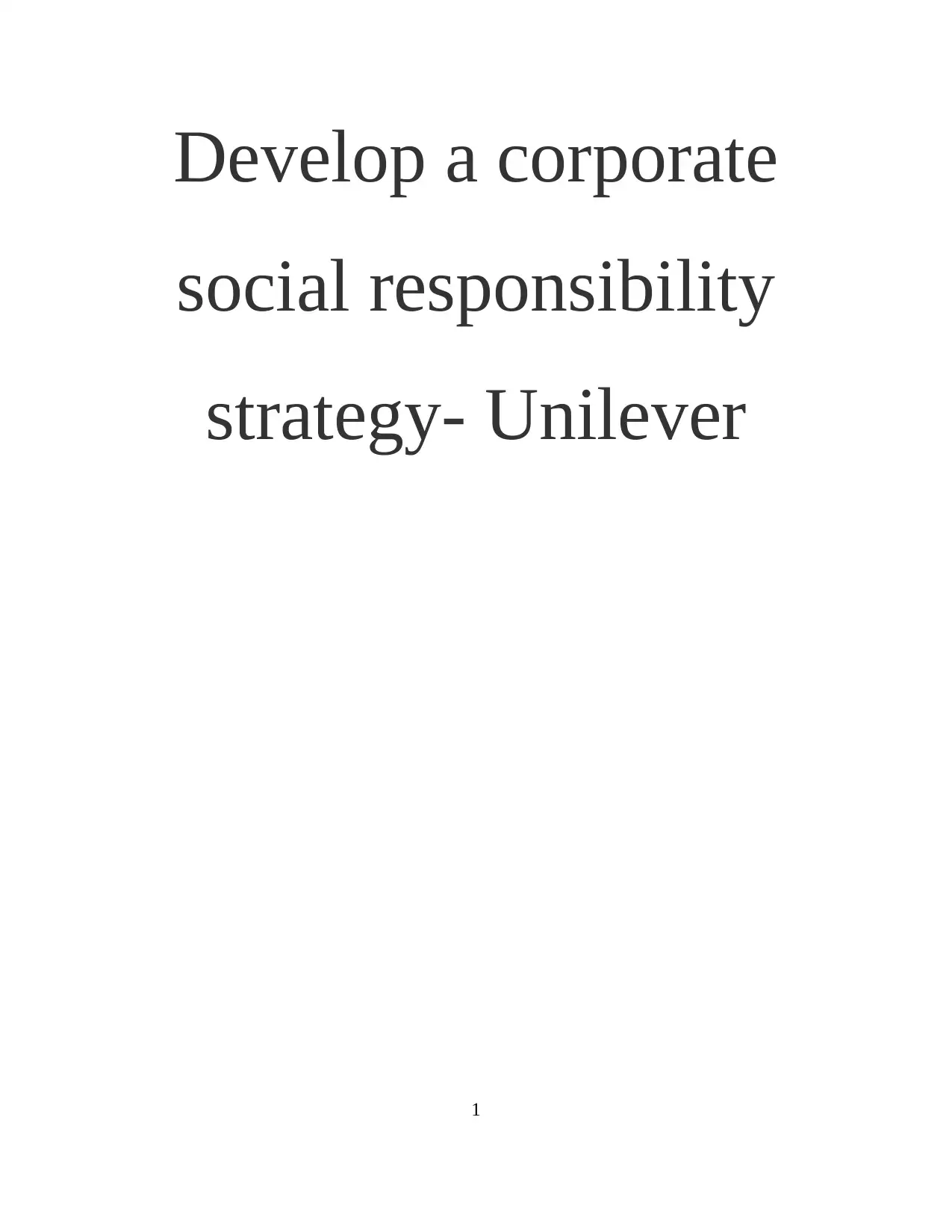
Develop a corporate
social responsibility
strategy- Unilever
1
social responsibility
strategy- Unilever
1
Paraphrase This Document
Need a fresh take? Get an instant paraphrase of this document with our AI Paraphraser
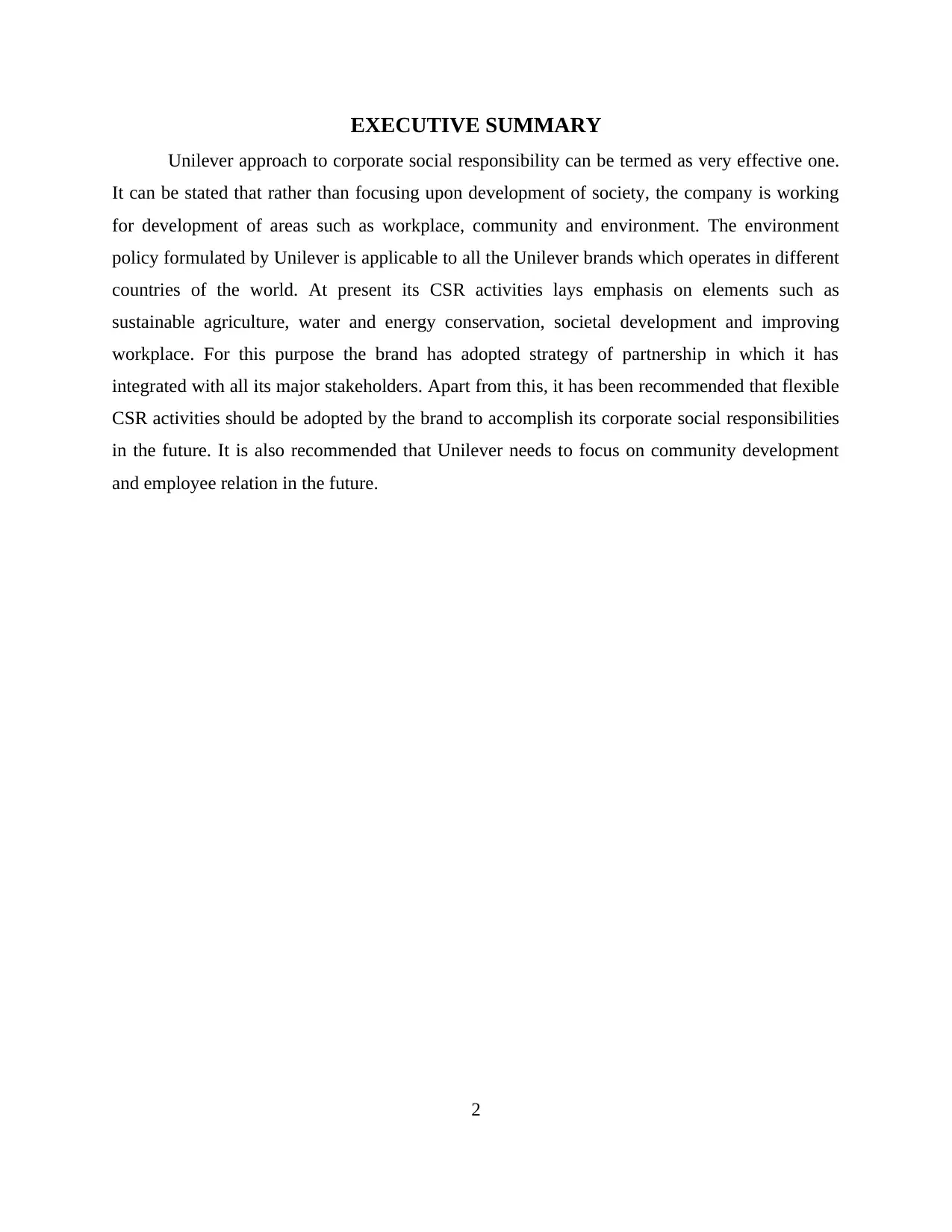
EXECUTIVE SUMMARY
Unilever approach to corporate social responsibility can be termed as very effective one.
It can be stated that rather than focusing upon development of society, the company is working
for development of areas such as workplace, community and environment. The environment
policy formulated by Unilever is applicable to all the Unilever brands which operates in different
countries of the world. At present its CSR activities lays emphasis on elements such as
sustainable agriculture, water and energy conservation, societal development and improving
workplace. For this purpose the brand has adopted strategy of partnership in which it has
integrated with all its major stakeholders. Apart from this, it has been recommended that flexible
CSR activities should be adopted by the brand to accomplish its corporate social responsibilities
in the future. It is also recommended that Unilever needs to focus on community development
and employee relation in the future.
2
Unilever approach to corporate social responsibility can be termed as very effective one.
It can be stated that rather than focusing upon development of society, the company is working
for development of areas such as workplace, community and environment. The environment
policy formulated by Unilever is applicable to all the Unilever brands which operates in different
countries of the world. At present its CSR activities lays emphasis on elements such as
sustainable agriculture, water and energy conservation, societal development and improving
workplace. For this purpose the brand has adopted strategy of partnership in which it has
integrated with all its major stakeholders. Apart from this, it has been recommended that flexible
CSR activities should be adopted by the brand to accomplish its corporate social responsibilities
in the future. It is also recommended that Unilever needs to focus on community development
and employee relation in the future.
2
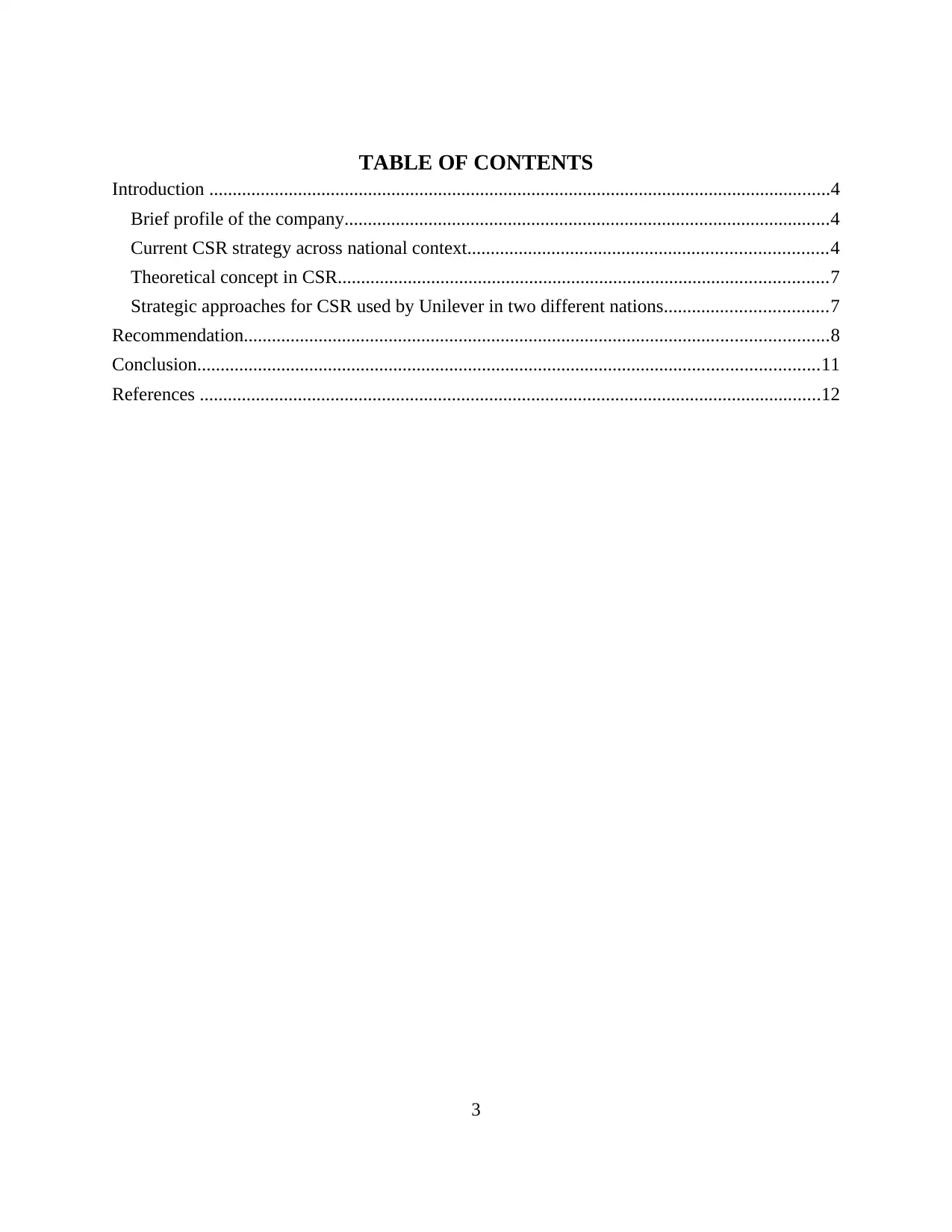
TABLE OF CONTENTS
Introduction .....................................................................................................................................4
Brief profile of the company........................................................................................................4
Current CSR strategy across national context.............................................................................4
Theoretical concept in CSR.........................................................................................................7
Strategic approaches for CSR used by Unilever in two different nations...................................7
Recommendation.............................................................................................................................8
Conclusion.....................................................................................................................................11
References .....................................................................................................................................12
3
Introduction .....................................................................................................................................4
Brief profile of the company........................................................................................................4
Current CSR strategy across national context.............................................................................4
Theoretical concept in CSR.........................................................................................................7
Strategic approaches for CSR used by Unilever in two different nations...................................7
Recommendation.............................................................................................................................8
Conclusion.....................................................................................................................................11
References .....................................................................................................................................12
3
⊘ This is a preview!⊘
Do you want full access?
Subscribe today to unlock all pages.

Trusted by 1+ million students worldwide
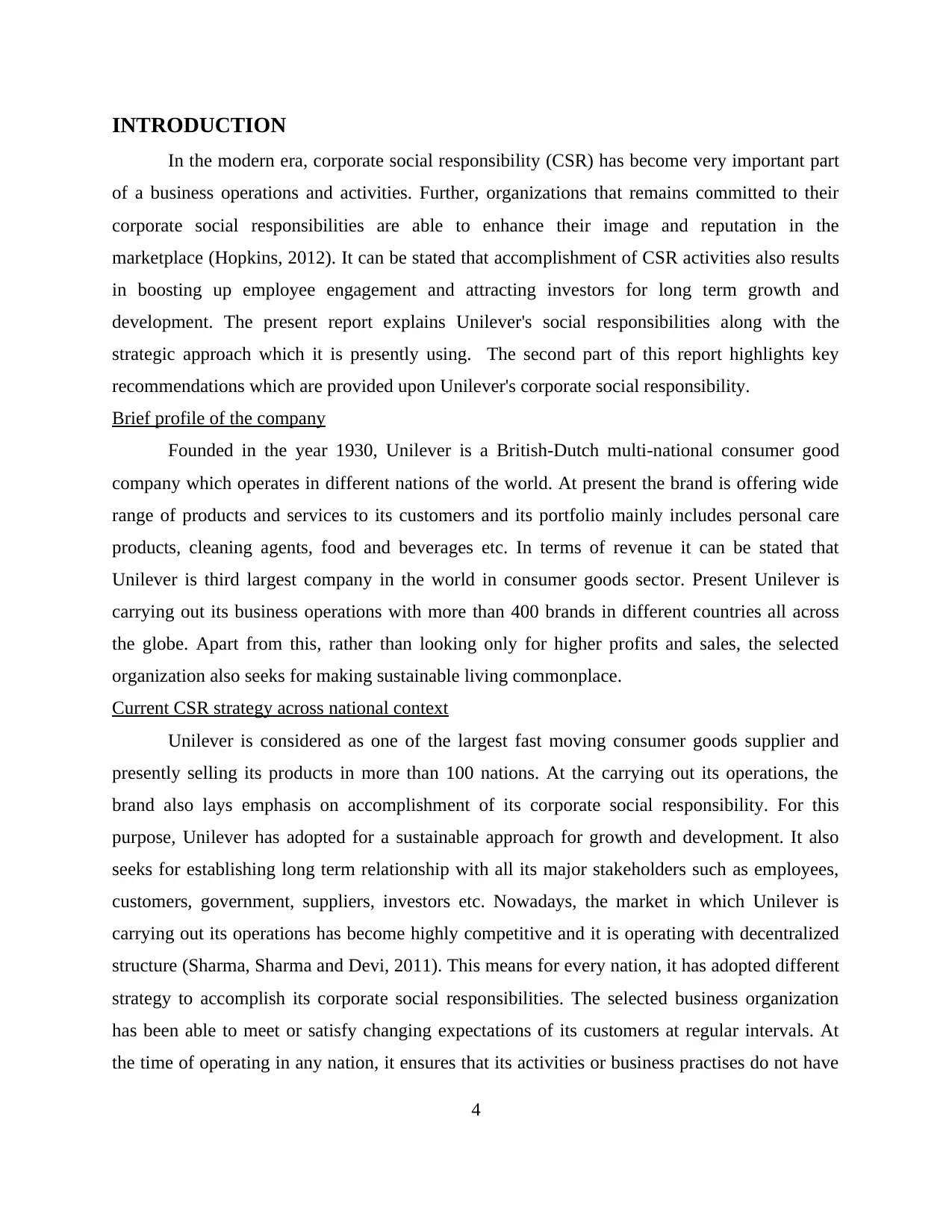
INTRODUCTION
In the modern era, corporate social responsibility (CSR) has become very important part
of a business operations and activities. Further, organizations that remains committed to their
corporate social responsibilities are able to enhance their image and reputation in the
marketplace (Hopkins, 2012). It can be stated that accomplishment of CSR activities also results
in boosting up employee engagement and attracting investors for long term growth and
development. The present report explains Unilever's social responsibilities along with the
strategic approach which it is presently using. The second part of this report highlights key
recommendations which are provided upon Unilever's corporate social responsibility.
Brief profile of the company
Founded in the year 1930, Unilever is a British-Dutch multi-national consumer good
company which operates in different nations of the world. At present the brand is offering wide
range of products and services to its customers and its portfolio mainly includes personal care
products, cleaning agents, food and beverages etc. In terms of revenue it can be stated that
Unilever is third largest company in the world in consumer goods sector. Present Unilever is
carrying out its business operations with more than 400 brands in different countries all across
the globe. Apart from this, rather than looking only for higher profits and sales, the selected
organization also seeks for making sustainable living commonplace.
Current CSR strategy across national context
Unilever is considered as one of the largest fast moving consumer goods supplier and
presently selling its products in more than 100 nations. At the carrying out its operations, the
brand also lays emphasis on accomplishment of its corporate social responsibility. For this
purpose, Unilever has adopted for a sustainable approach for growth and development. It also
seeks for establishing long term relationship with all its major stakeholders such as employees,
customers, government, suppliers, investors etc. Nowadays, the market in which Unilever is
carrying out its operations has become highly competitive and it is operating with decentralized
structure (Sharma, Sharma and Devi, 2011). This means for every nation, it has adopted different
strategy to accomplish its corporate social responsibilities. The selected business organization
has been able to meet or satisfy changing expectations of its customers at regular intervals. At
the time of operating in any nation, it ensures that its activities or business practises do not have
4
In the modern era, corporate social responsibility (CSR) has become very important part
of a business operations and activities. Further, organizations that remains committed to their
corporate social responsibilities are able to enhance their image and reputation in the
marketplace (Hopkins, 2012). It can be stated that accomplishment of CSR activities also results
in boosting up employee engagement and attracting investors for long term growth and
development. The present report explains Unilever's social responsibilities along with the
strategic approach which it is presently using. The second part of this report highlights key
recommendations which are provided upon Unilever's corporate social responsibility.
Brief profile of the company
Founded in the year 1930, Unilever is a British-Dutch multi-national consumer good
company which operates in different nations of the world. At present the brand is offering wide
range of products and services to its customers and its portfolio mainly includes personal care
products, cleaning agents, food and beverages etc. In terms of revenue it can be stated that
Unilever is third largest company in the world in consumer goods sector. Present Unilever is
carrying out its business operations with more than 400 brands in different countries all across
the globe. Apart from this, rather than looking only for higher profits and sales, the selected
organization also seeks for making sustainable living commonplace.
Current CSR strategy across national context
Unilever is considered as one of the largest fast moving consumer goods supplier and
presently selling its products in more than 100 nations. At the carrying out its operations, the
brand also lays emphasis on accomplishment of its corporate social responsibility. For this
purpose, Unilever has adopted for a sustainable approach for growth and development. It also
seeks for establishing long term relationship with all its major stakeholders such as employees,
customers, government, suppliers, investors etc. Nowadays, the market in which Unilever is
carrying out its operations has become highly competitive and it is operating with decentralized
structure (Sharma, Sharma and Devi, 2011). This means for every nation, it has adopted different
strategy to accomplish its corporate social responsibilities. The selected business organization
has been able to meet or satisfy changing expectations of its customers at regular intervals. At
the time of operating in any nation, it ensures that its activities or business practises do not have
4
Paraphrase This Document
Need a fresh take? Get an instant paraphrase of this document with our AI Paraphraser
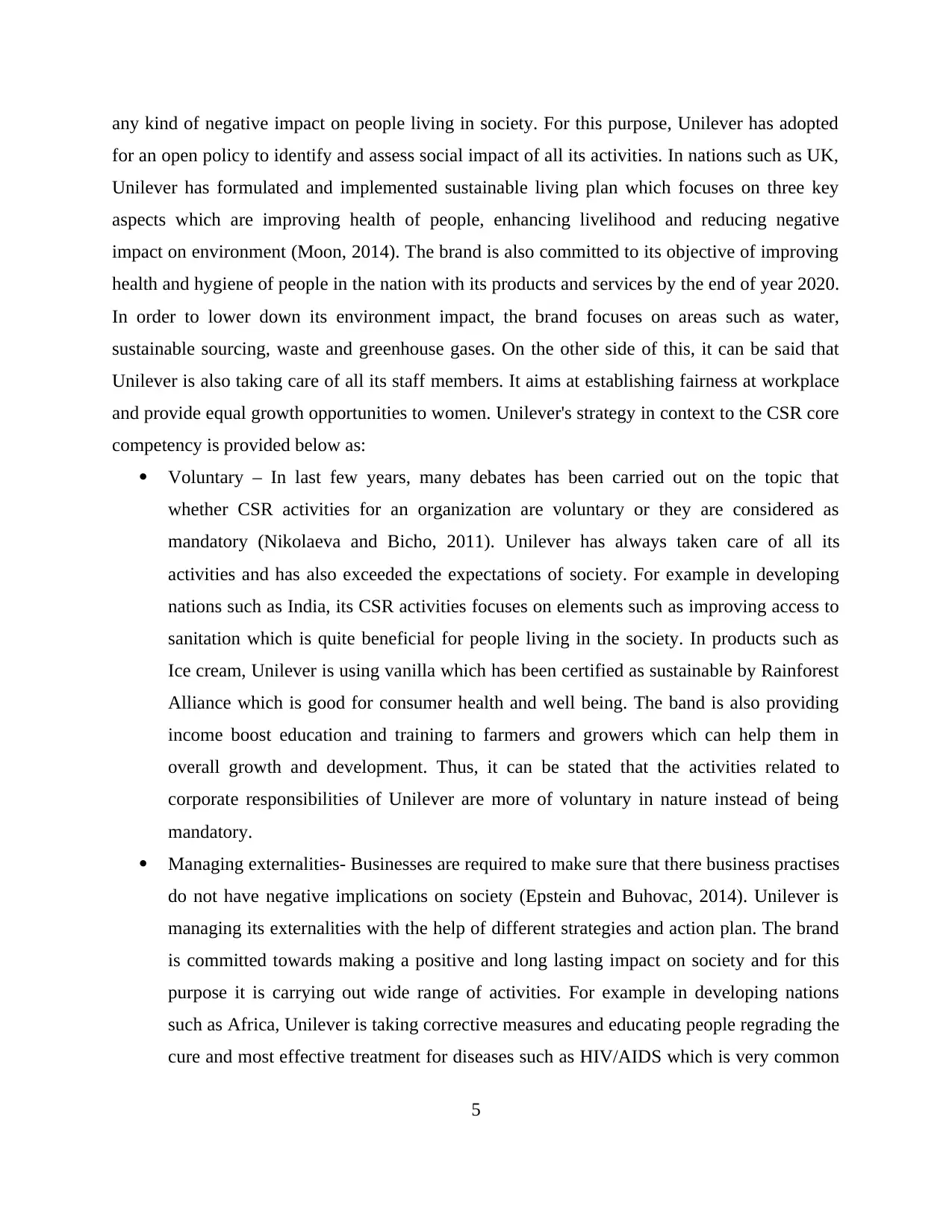
any kind of negative impact on people living in society. For this purpose, Unilever has adopted
for an open policy to identify and assess social impact of all its activities. In nations such as UK,
Unilever has formulated and implemented sustainable living plan which focuses on three key
aspects which are improving health of people, enhancing livelihood and reducing negative
impact on environment (Moon, 2014). The brand is also committed to its objective of improving
health and hygiene of people in the nation with its products and services by the end of year 2020.
In order to lower down its environment impact, the brand focuses on areas such as water,
sustainable sourcing, waste and greenhouse gases. On the other side of this, it can be said that
Unilever is also taking care of all its staff members. It aims at establishing fairness at workplace
and provide equal growth opportunities to women. Unilever's strategy in context to the CSR core
competency is provided below as:
Voluntary – In last few years, many debates has been carried out on the topic that
whether CSR activities for an organization are voluntary or they are considered as
mandatory (Nikolaeva and Bicho, 2011). Unilever has always taken care of all its
activities and has also exceeded the expectations of society. For example in developing
nations such as India, its CSR activities focuses on elements such as improving access to
sanitation which is quite beneficial for people living in the society. In products such as
Ice cream, Unilever is using vanilla which has been certified as sustainable by Rainforest
Alliance which is good for consumer health and well being. The band is also providing
income boost education and training to farmers and growers which can help them in
overall growth and development. Thus, it can be stated that the activities related to
corporate responsibilities of Unilever are more of voluntary in nature instead of being
mandatory.
Managing externalities- Businesses are required to make sure that there business practises
do not have negative implications on society (Epstein and Buhovac, 2014). Unilever is
managing its externalities with the help of different strategies and action plan. The brand
is committed towards making a positive and long lasting impact on society and for this
purpose it is carrying out wide range of activities. For example in developing nations
such as Africa, Unilever is taking corrective measures and educating people regrading the
cure and most effective treatment for diseases such as HIV/AIDS which is very common
5
for an open policy to identify and assess social impact of all its activities. In nations such as UK,
Unilever has formulated and implemented sustainable living plan which focuses on three key
aspects which are improving health of people, enhancing livelihood and reducing negative
impact on environment (Moon, 2014). The brand is also committed to its objective of improving
health and hygiene of people in the nation with its products and services by the end of year 2020.
In order to lower down its environment impact, the brand focuses on areas such as water,
sustainable sourcing, waste and greenhouse gases. On the other side of this, it can be said that
Unilever is also taking care of all its staff members. It aims at establishing fairness at workplace
and provide equal growth opportunities to women. Unilever's strategy in context to the CSR core
competency is provided below as:
Voluntary – In last few years, many debates has been carried out on the topic that
whether CSR activities for an organization are voluntary or they are considered as
mandatory (Nikolaeva and Bicho, 2011). Unilever has always taken care of all its
activities and has also exceeded the expectations of society. For example in developing
nations such as India, its CSR activities focuses on elements such as improving access to
sanitation which is quite beneficial for people living in the society. In products such as
Ice cream, Unilever is using vanilla which has been certified as sustainable by Rainforest
Alliance which is good for consumer health and well being. The band is also providing
income boost education and training to farmers and growers which can help them in
overall growth and development. Thus, it can be stated that the activities related to
corporate responsibilities of Unilever are more of voluntary in nature instead of being
mandatory.
Managing externalities- Businesses are required to make sure that there business practises
do not have negative implications on society (Epstein and Buhovac, 2014). Unilever is
managing its externalities with the help of different strategies and action plan. The brand
is committed towards making a positive and long lasting impact on society and for this
purpose it is carrying out wide range of activities. For example in developing nations
such as Africa, Unilever is taking corrective measures and educating people regrading the
cure and most effective treatment for diseases such as HIV/AIDS which is very common
5
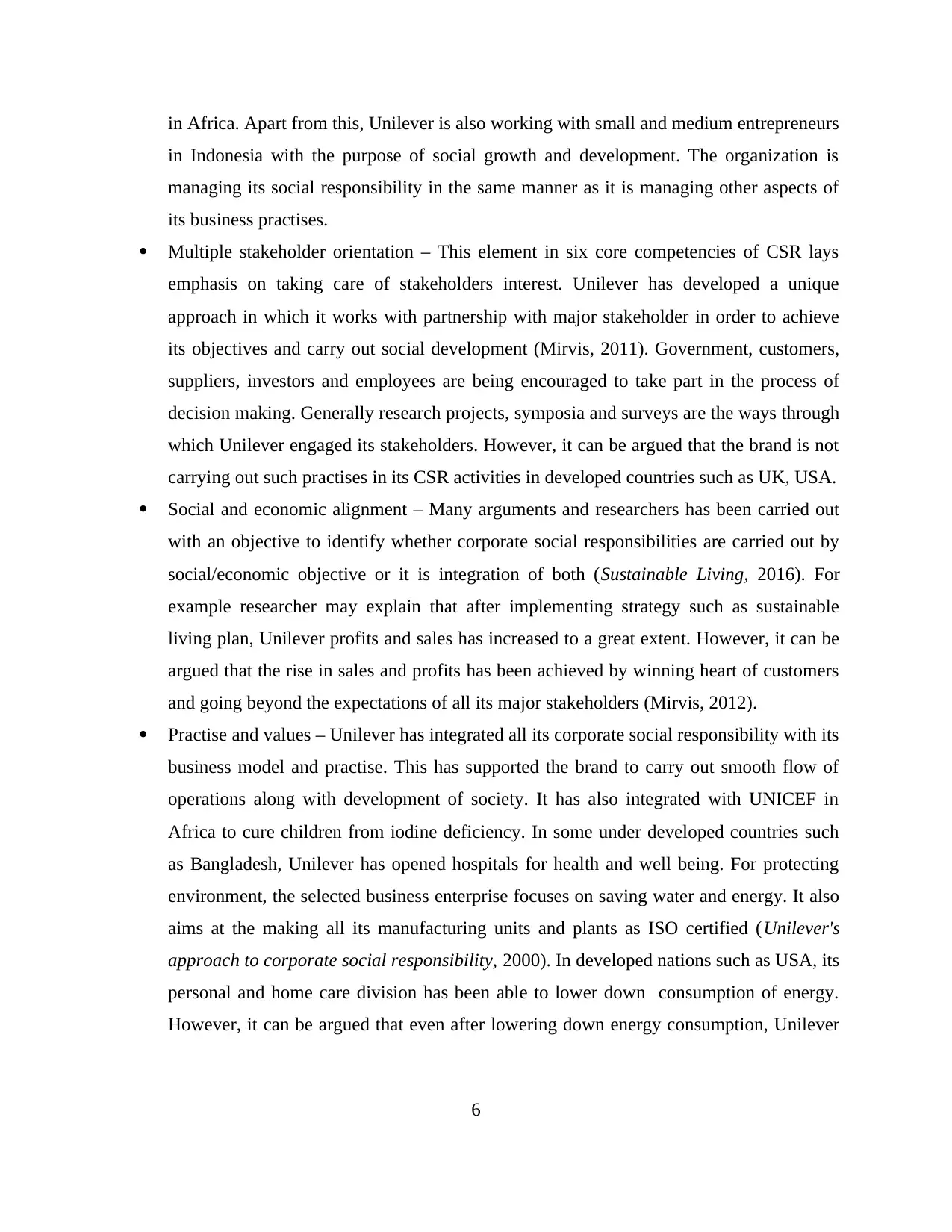
in Africa. Apart from this, Unilever is also working with small and medium entrepreneurs
in Indonesia with the purpose of social growth and development. The organization is
managing its social responsibility in the same manner as it is managing other aspects of
its business practises.
Multiple stakeholder orientation – This element in six core competencies of CSR lays
emphasis on taking care of stakeholders interest. Unilever has developed a unique
approach in which it works with partnership with major stakeholder in order to achieve
its objectives and carry out social development (Mirvis, 2011). Government, customers,
suppliers, investors and employees are being encouraged to take part in the process of
decision making. Generally research projects, symposia and surveys are the ways through
which Unilever engaged its stakeholders. However, it can be argued that the brand is not
carrying out such practises in its CSR activities in developed countries such as UK, USA.
Social and economic alignment – Many arguments and researchers has been carried out
with an objective to identify whether corporate social responsibilities are carried out by
social/economic objective or it is integration of both (Sustainable Living, 2016). For
example researcher may explain that after implementing strategy such as sustainable
living plan, Unilever profits and sales has increased to a great extent. However, it can be
argued that the rise in sales and profits has been achieved by winning heart of customers
and going beyond the expectations of all its major stakeholders (Mirvis, 2012).
Practise and values – Unilever has integrated all its corporate social responsibility with its
business model and practise. This has supported the brand to carry out smooth flow of
operations along with development of society. It has also integrated with UNICEF in
Africa to cure children from iodine deficiency. In some under developed countries such
as Bangladesh, Unilever has opened hospitals for health and well being. For protecting
environment, the selected business enterprise focuses on saving water and energy. It also
aims at the making all its manufacturing units and plants as ISO certified (Unilever's
approach to corporate social responsibility, 2000). In developed nations such as USA, its
personal and home care division has been able to lower down consumption of energy.
However, it can be argued that even after lowering down energy consumption, Unilever
6
in Indonesia with the purpose of social growth and development. The organization is
managing its social responsibility in the same manner as it is managing other aspects of
its business practises.
Multiple stakeholder orientation – This element in six core competencies of CSR lays
emphasis on taking care of stakeholders interest. Unilever has developed a unique
approach in which it works with partnership with major stakeholder in order to achieve
its objectives and carry out social development (Mirvis, 2011). Government, customers,
suppliers, investors and employees are being encouraged to take part in the process of
decision making. Generally research projects, symposia and surveys are the ways through
which Unilever engaged its stakeholders. However, it can be argued that the brand is not
carrying out such practises in its CSR activities in developed countries such as UK, USA.
Social and economic alignment – Many arguments and researchers has been carried out
with an objective to identify whether corporate social responsibilities are carried out by
social/economic objective or it is integration of both (Sustainable Living, 2016). For
example researcher may explain that after implementing strategy such as sustainable
living plan, Unilever profits and sales has increased to a great extent. However, it can be
argued that the rise in sales and profits has been achieved by winning heart of customers
and going beyond the expectations of all its major stakeholders (Mirvis, 2012).
Practise and values – Unilever has integrated all its corporate social responsibility with its
business model and practise. This has supported the brand to carry out smooth flow of
operations along with development of society. It has also integrated with UNICEF in
Africa to cure children from iodine deficiency. In some under developed countries such
as Bangladesh, Unilever has opened hospitals for health and well being. For protecting
environment, the selected business enterprise focuses on saving water and energy. It also
aims at the making all its manufacturing units and plants as ISO certified (Unilever's
approach to corporate social responsibility, 2000). In developed nations such as USA, its
personal and home care division has been able to lower down consumption of energy.
However, it can be argued that even after lowering down energy consumption, Unilever
6
⊘ This is a preview!⊘
Do you want full access?
Subscribe today to unlock all pages.

Trusted by 1+ million students worldwide
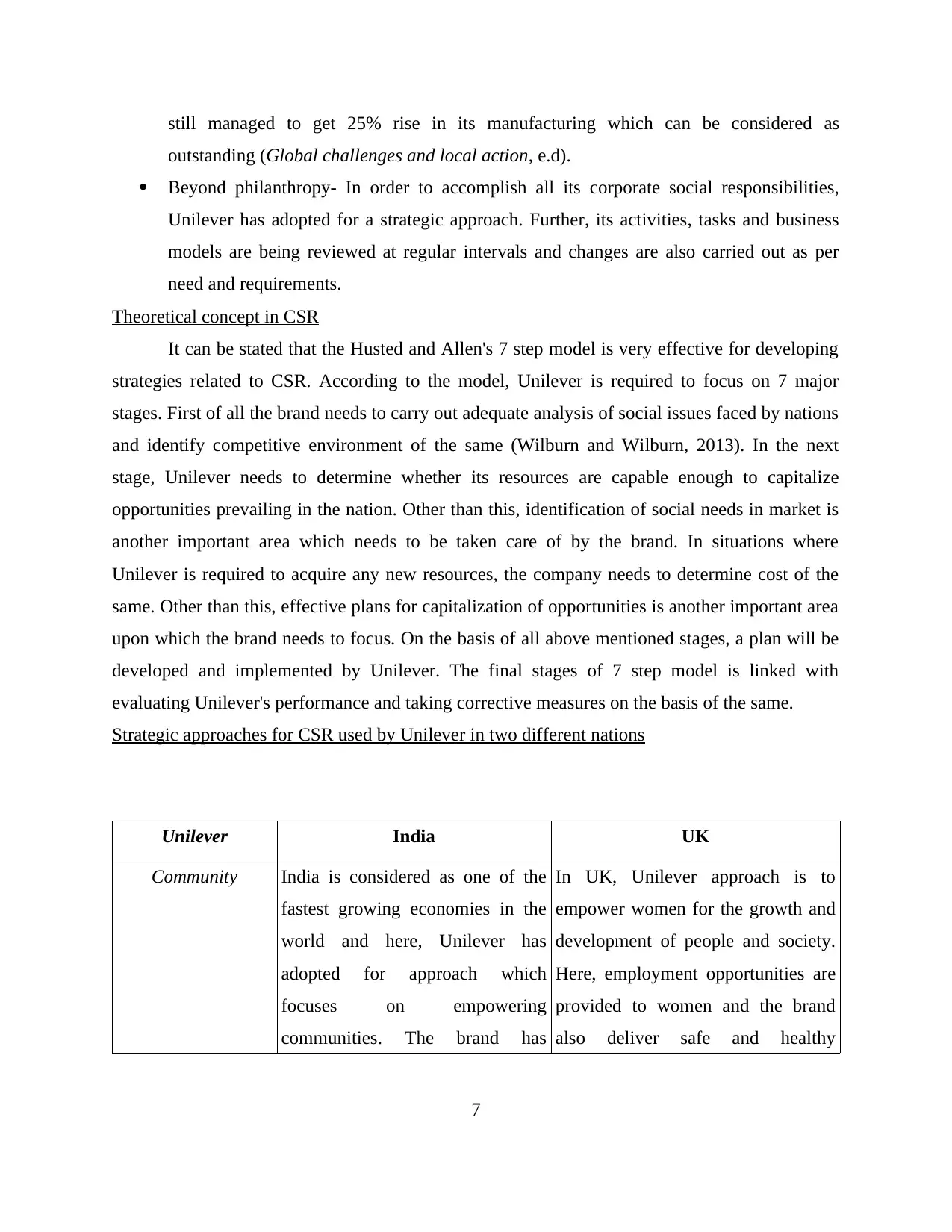
still managed to get 25% rise in its manufacturing which can be considered as
outstanding (Global challenges and local action, e.d).
Beyond philanthropy- In order to accomplish all its corporate social responsibilities,
Unilever has adopted for a strategic approach. Further, its activities, tasks and business
models are being reviewed at regular intervals and changes are also carried out as per
need and requirements.
Theoretical concept in CSR
It can be stated that the Husted and Allen's 7 step model is very effective for developing
strategies related to CSR. According to the model, Unilever is required to focus on 7 major
stages. First of all the brand needs to carry out adequate analysis of social issues faced by nations
and identify competitive environment of the same (Wilburn and Wilburn, 2013). In the next
stage, Unilever needs to determine whether its resources are capable enough to capitalize
opportunities prevailing in the nation. Other than this, identification of social needs in market is
another important area which needs to be taken care of by the brand. In situations where
Unilever is required to acquire any new resources, the company needs to determine cost of the
same. Other than this, effective plans for capitalization of opportunities is another important area
upon which the brand needs to focus. On the basis of all above mentioned stages, a plan will be
developed and implemented by Unilever. The final stages of 7 step model is linked with
evaluating Unilever's performance and taking corrective measures on the basis of the same.
Strategic approaches for CSR used by Unilever in two different nations
Unilever India UK
Community India is considered as one of the
fastest growing economies in the
world and here, Unilever has
adopted for approach which
focuses on empowering
communities. The brand has
In UK, Unilever approach is to
empower women for the growth and
development of people and society.
Here, employment opportunities are
provided to women and the brand
also deliver safe and healthy
7
outstanding (Global challenges and local action, e.d).
Beyond philanthropy- In order to accomplish all its corporate social responsibilities,
Unilever has adopted for a strategic approach. Further, its activities, tasks and business
models are being reviewed at regular intervals and changes are also carried out as per
need and requirements.
Theoretical concept in CSR
It can be stated that the Husted and Allen's 7 step model is very effective for developing
strategies related to CSR. According to the model, Unilever is required to focus on 7 major
stages. First of all the brand needs to carry out adequate analysis of social issues faced by nations
and identify competitive environment of the same (Wilburn and Wilburn, 2013). In the next
stage, Unilever needs to determine whether its resources are capable enough to capitalize
opportunities prevailing in the nation. Other than this, identification of social needs in market is
another important area which needs to be taken care of by the brand. In situations where
Unilever is required to acquire any new resources, the company needs to determine cost of the
same. Other than this, effective plans for capitalization of opportunities is another important area
upon which the brand needs to focus. On the basis of all above mentioned stages, a plan will be
developed and implemented by Unilever. The final stages of 7 step model is linked with
evaluating Unilever's performance and taking corrective measures on the basis of the same.
Strategic approaches for CSR used by Unilever in two different nations
Unilever India UK
Community India is considered as one of the
fastest growing economies in the
world and here, Unilever has
adopted for approach which
focuses on empowering
communities. The brand has
In UK, Unilever approach is to
empower women for the growth and
development of people and society.
Here, employment opportunities are
provided to women and the brand
also deliver safe and healthy
7
Paraphrase This Document
Need a fresh take? Get an instant paraphrase of this document with our AI Paraphraser
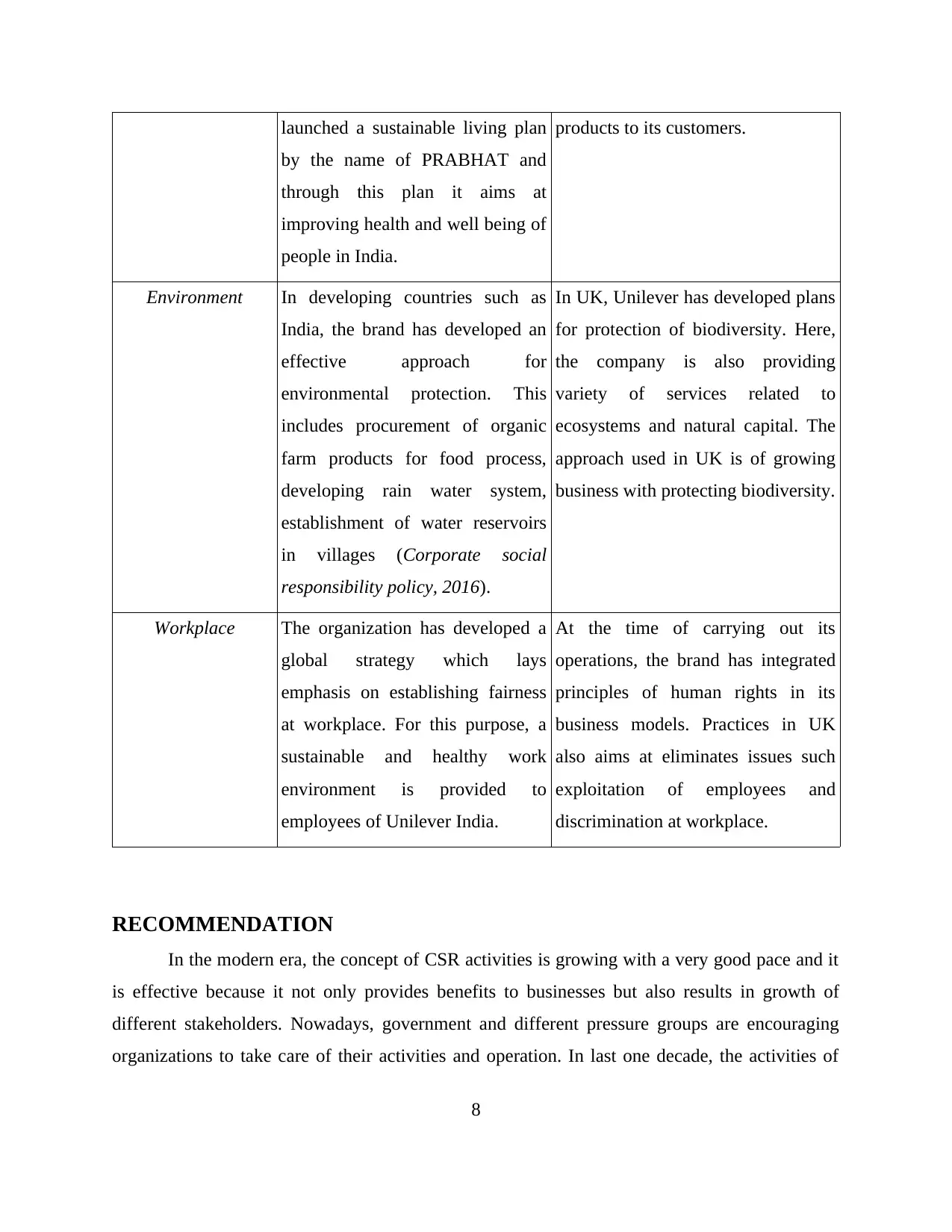
launched a sustainable living plan
by the name of PRABHAT and
through this plan it aims at
improving health and well being of
people in India.
products to its customers.
Environment In developing countries such as
India, the brand has developed an
effective approach for
environmental protection. This
includes procurement of organic
farm products for food process,
developing rain water system,
establishment of water reservoirs
in villages (Corporate social
responsibility policy, 2016).
In UK, Unilever has developed plans
for protection of biodiversity. Here,
the company is also providing
variety of services related to
ecosystems and natural capital. The
approach used in UK is of growing
business with protecting biodiversity.
Workplace The organization has developed a
global strategy which lays
emphasis on establishing fairness
at workplace. For this purpose, a
sustainable and healthy work
environment is provided to
employees of Unilever India.
At the time of carrying out its
operations, the brand has integrated
principles of human rights in its
business models. Practices in UK
also aims at eliminates issues such
exploitation of employees and
discrimination at workplace.
RECOMMENDATION
In the modern era, the concept of CSR activities is growing with a very good pace and it
is effective because it not only provides benefits to businesses but also results in growth of
different stakeholders. Nowadays, government and different pressure groups are encouraging
organizations to take care of their activities and operation. In last one decade, the activities of
8
by the name of PRABHAT and
through this plan it aims at
improving health and well being of
people in India.
products to its customers.
Environment In developing countries such as
India, the brand has developed an
effective approach for
environmental protection. This
includes procurement of organic
farm products for food process,
developing rain water system,
establishment of water reservoirs
in villages (Corporate social
responsibility policy, 2016).
In UK, Unilever has developed plans
for protection of biodiversity. Here,
the company is also providing
variety of services related to
ecosystems and natural capital. The
approach used in UK is of growing
business with protecting biodiversity.
Workplace The organization has developed a
global strategy which lays
emphasis on establishing fairness
at workplace. For this purpose, a
sustainable and healthy work
environment is provided to
employees of Unilever India.
At the time of carrying out its
operations, the brand has integrated
principles of human rights in its
business models. Practices in UK
also aims at eliminates issues such
exploitation of employees and
discrimination at workplace.
RECOMMENDATION
In the modern era, the concept of CSR activities is growing with a very good pace and it
is effective because it not only provides benefits to businesses but also results in growth of
different stakeholders. Nowadays, government and different pressure groups are encouraging
organizations to take care of their activities and operation. In last one decade, the activities of
8
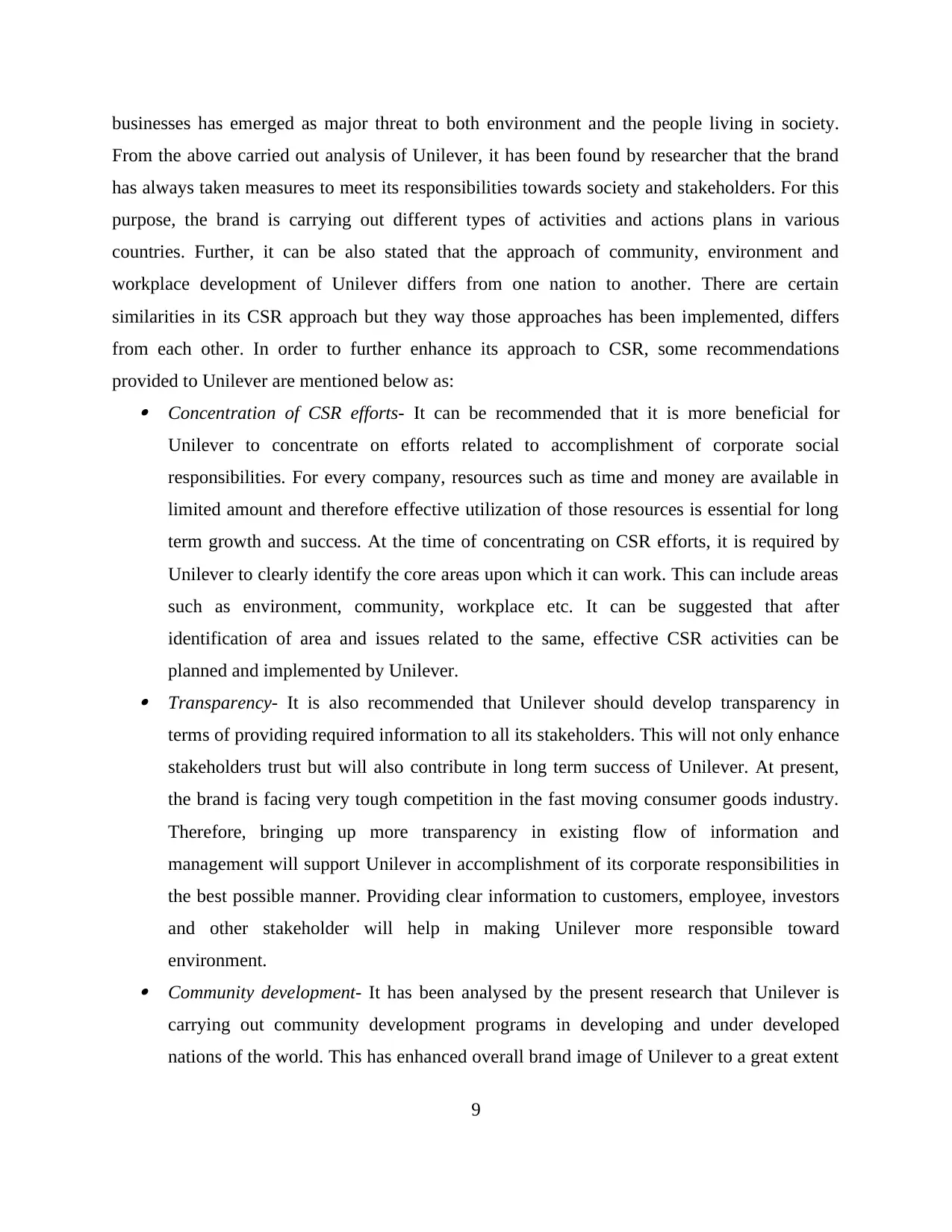
businesses has emerged as major threat to both environment and the people living in society.
From the above carried out analysis of Unilever, it has been found by researcher that the brand
has always taken measures to meet its responsibilities towards society and stakeholders. For this
purpose, the brand is carrying out different types of activities and actions plans in various
countries. Further, it can be also stated that the approach of community, environment and
workplace development of Unilever differs from one nation to another. There are certain
similarities in its CSR approach but they way those approaches has been implemented, differs
from each other. In order to further enhance its approach to CSR, some recommendations
provided to Unilever are mentioned below as: Concentration of CSR efforts- It can be recommended that it is more beneficial for
Unilever to concentrate on efforts related to accomplishment of corporate social
responsibilities. For every company, resources such as time and money are available in
limited amount and therefore effective utilization of those resources is essential for long
term growth and success. At the time of concentrating on CSR efforts, it is required by
Unilever to clearly identify the core areas upon which it can work. This can include areas
such as environment, community, workplace etc. It can be suggested that after
identification of area and issues related to the same, effective CSR activities can be
planned and implemented by Unilever. Transparency- It is also recommended that Unilever should develop transparency in
terms of providing required information to all its stakeholders. This will not only enhance
stakeholders trust but will also contribute in long term success of Unilever. At present,
the brand is facing very tough competition in the fast moving consumer goods industry.
Therefore, bringing up more transparency in existing flow of information and
management will support Unilever in accomplishment of its corporate responsibilities in
the best possible manner. Providing clear information to customers, employee, investors
and other stakeholder will help in making Unilever more responsible toward
environment. Community development- It has been analysed by the present research that Unilever is
carrying out community development programs in developing and under developed
nations of the world. This has enhanced overall brand image of Unilever to a great extent
9
From the above carried out analysis of Unilever, it has been found by researcher that the brand
has always taken measures to meet its responsibilities towards society and stakeholders. For this
purpose, the brand is carrying out different types of activities and actions plans in various
countries. Further, it can be also stated that the approach of community, environment and
workplace development of Unilever differs from one nation to another. There are certain
similarities in its CSR approach but they way those approaches has been implemented, differs
from each other. In order to further enhance its approach to CSR, some recommendations
provided to Unilever are mentioned below as: Concentration of CSR efforts- It can be recommended that it is more beneficial for
Unilever to concentrate on efforts related to accomplishment of corporate social
responsibilities. For every company, resources such as time and money are available in
limited amount and therefore effective utilization of those resources is essential for long
term growth and success. At the time of concentrating on CSR efforts, it is required by
Unilever to clearly identify the core areas upon which it can work. This can include areas
such as environment, community, workplace etc. It can be suggested that after
identification of area and issues related to the same, effective CSR activities can be
planned and implemented by Unilever. Transparency- It is also recommended that Unilever should develop transparency in
terms of providing required information to all its stakeholders. This will not only enhance
stakeholders trust but will also contribute in long term success of Unilever. At present,
the brand is facing very tough competition in the fast moving consumer goods industry.
Therefore, bringing up more transparency in existing flow of information and
management will support Unilever in accomplishment of its corporate responsibilities in
the best possible manner. Providing clear information to customers, employee, investors
and other stakeholder will help in making Unilever more responsible toward
environment. Community development- It has been analysed by the present research that Unilever is
carrying out community development programs in developing and under developed
nations of the world. This has enhanced overall brand image of Unilever to a great extent
9
⊘ This is a preview!⊘
Do you want full access?
Subscribe today to unlock all pages.

Trusted by 1+ million students worldwide
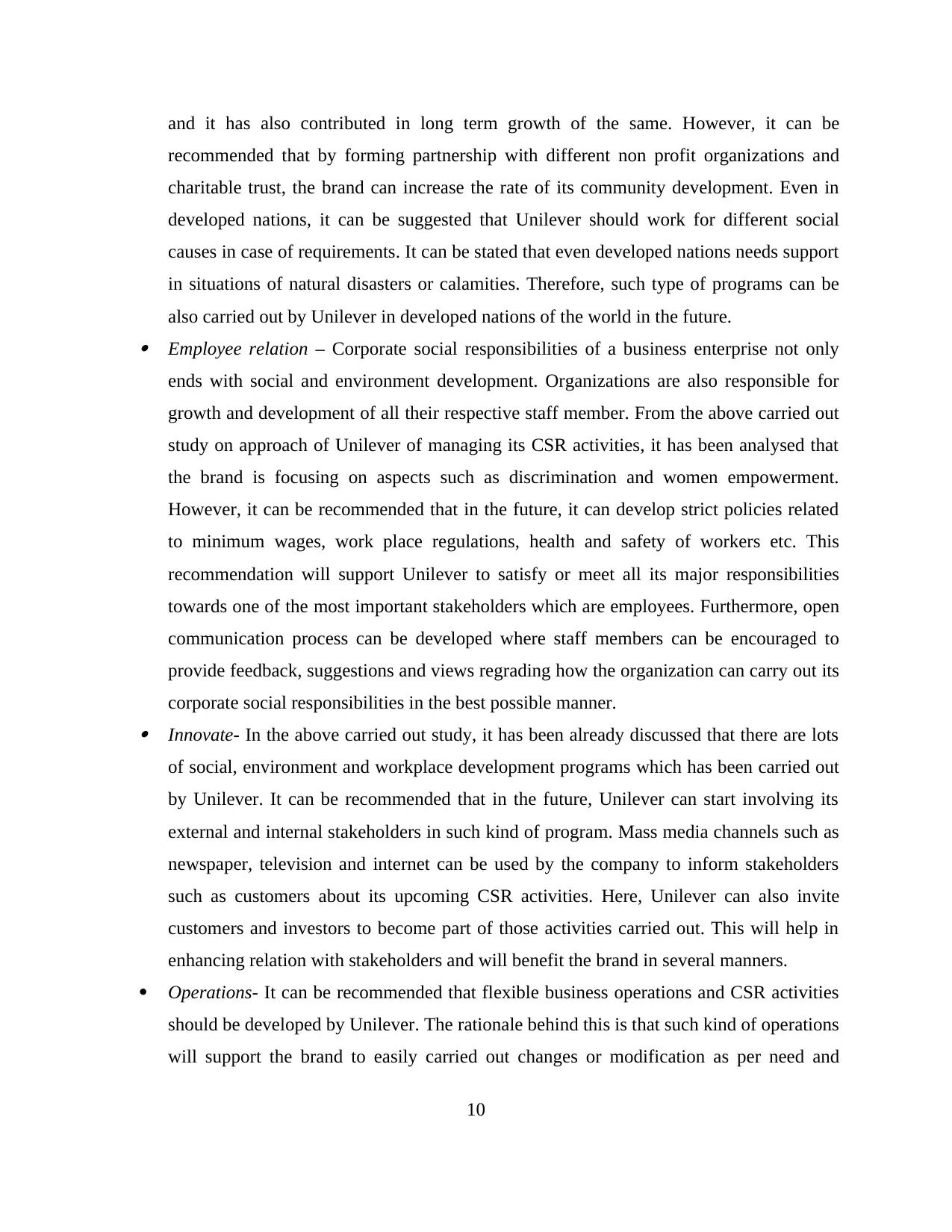
and it has also contributed in long term growth of the same. However, it can be
recommended that by forming partnership with different non profit organizations and
charitable trust, the brand can increase the rate of its community development. Even in
developed nations, it can be suggested that Unilever should work for different social
causes in case of requirements. It can be stated that even developed nations needs support
in situations of natural disasters or calamities. Therefore, such type of programs can be
also carried out by Unilever in developed nations of the world in the future. Employee relation – Corporate social responsibilities of a business enterprise not only
ends with social and environment development. Organizations are also responsible for
growth and development of all their respective staff member. From the above carried out
study on approach of Unilever of managing its CSR activities, it has been analysed that
the brand is focusing on aspects such as discrimination and women empowerment.
However, it can be recommended that in the future, it can develop strict policies related
to minimum wages, work place regulations, health and safety of workers etc. This
recommendation will support Unilever to satisfy or meet all its major responsibilities
towards one of the most important stakeholders which are employees. Furthermore, open
communication process can be developed where staff members can be encouraged to
provide feedback, suggestions and views regrading how the organization can carry out its
corporate social responsibilities in the best possible manner. Innovate- In the above carried out study, it has been already discussed that there are lots
of social, environment and workplace development programs which has been carried out
by Unilever. It can be recommended that in the future, Unilever can start involving its
external and internal stakeholders in such kind of program. Mass media channels such as
newspaper, television and internet can be used by the company to inform stakeholders
such as customers about its upcoming CSR activities. Here, Unilever can also invite
customers and investors to become part of those activities carried out. This will help in
enhancing relation with stakeholders and will benefit the brand in several manners.
Operations- It can be recommended that flexible business operations and CSR activities
should be developed by Unilever. The rationale behind this is that such kind of operations
will support the brand to easily carried out changes or modification as per need and
10
recommended that by forming partnership with different non profit organizations and
charitable trust, the brand can increase the rate of its community development. Even in
developed nations, it can be suggested that Unilever should work for different social
causes in case of requirements. It can be stated that even developed nations needs support
in situations of natural disasters or calamities. Therefore, such type of programs can be
also carried out by Unilever in developed nations of the world in the future. Employee relation – Corporate social responsibilities of a business enterprise not only
ends with social and environment development. Organizations are also responsible for
growth and development of all their respective staff member. From the above carried out
study on approach of Unilever of managing its CSR activities, it has been analysed that
the brand is focusing on aspects such as discrimination and women empowerment.
However, it can be recommended that in the future, it can develop strict policies related
to minimum wages, work place regulations, health and safety of workers etc. This
recommendation will support Unilever to satisfy or meet all its major responsibilities
towards one of the most important stakeholders which are employees. Furthermore, open
communication process can be developed where staff members can be encouraged to
provide feedback, suggestions and views regrading how the organization can carry out its
corporate social responsibilities in the best possible manner. Innovate- In the above carried out study, it has been already discussed that there are lots
of social, environment and workplace development programs which has been carried out
by Unilever. It can be recommended that in the future, Unilever can start involving its
external and internal stakeholders in such kind of program. Mass media channels such as
newspaper, television and internet can be used by the company to inform stakeholders
such as customers about its upcoming CSR activities. Here, Unilever can also invite
customers and investors to become part of those activities carried out. This will help in
enhancing relation with stakeholders and will benefit the brand in several manners.
Operations- It can be recommended that flexible business operations and CSR activities
should be developed by Unilever. The rationale behind this is that such kind of operations
will support the brand to easily carried out changes or modification as per need and
10
Paraphrase This Document
Need a fresh take? Get an instant paraphrase of this document with our AI Paraphraser
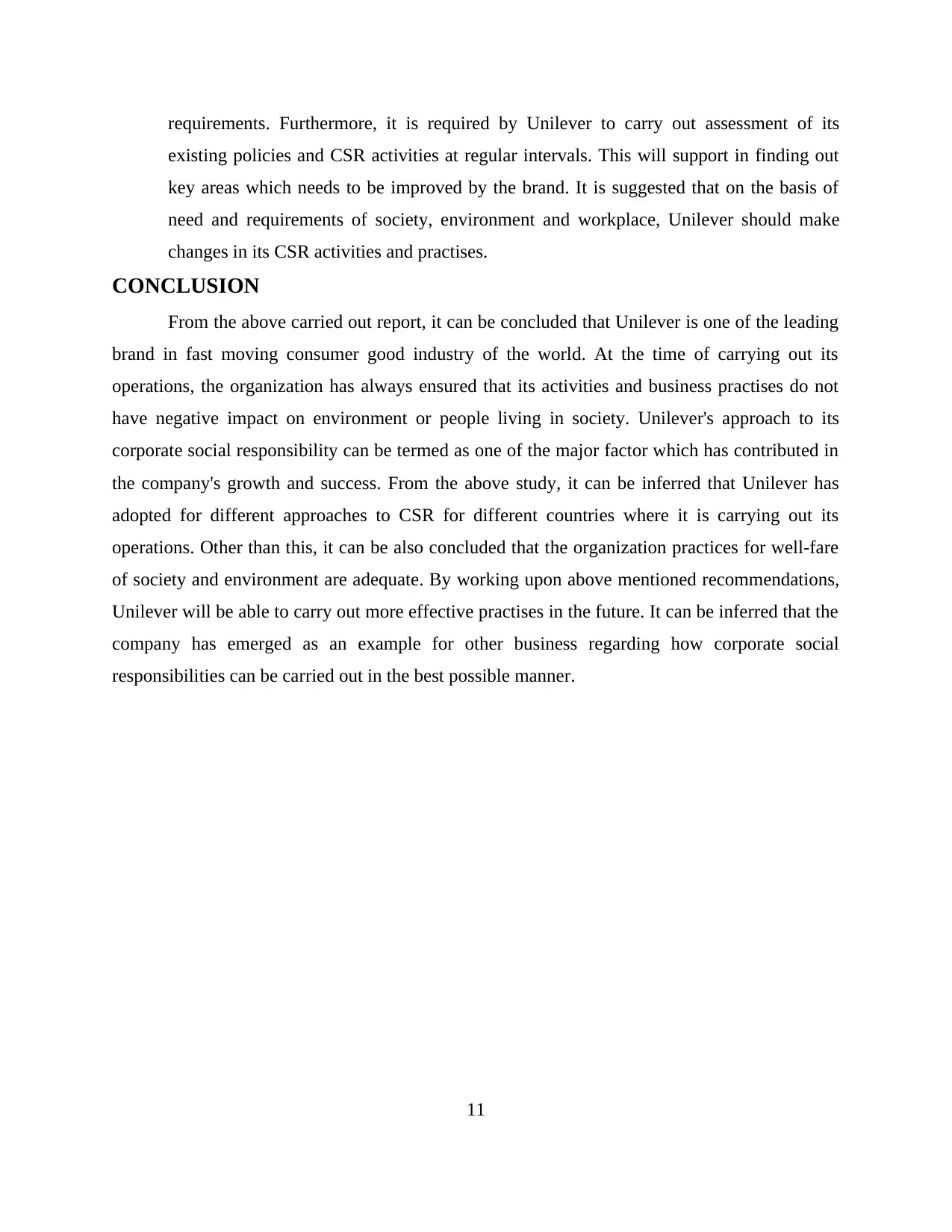
requirements. Furthermore, it is required by Unilever to carry out assessment of its
existing policies and CSR activities at regular intervals. This will support in finding out
key areas which needs to be improved by the brand. It is suggested that on the basis of
need and requirements of society, environment and workplace, Unilever should make
changes in its CSR activities and practises.
CONCLUSION
From the above carried out report, it can be concluded that Unilever is one of the leading
brand in fast moving consumer good industry of the world. At the time of carrying out its
operations, the organization has always ensured that its activities and business practises do not
have negative impact on environment or people living in society. Unilever's approach to its
corporate social responsibility can be termed as one of the major factor which has contributed in
the company's growth and success. From the above study, it can be inferred that Unilever has
adopted for different approaches to CSR for different countries where it is carrying out its
operations. Other than this, it can be also concluded that the organization practices for well-fare
of society and environment are adequate. By working upon above mentioned recommendations,
Unilever will be able to carry out more effective practises in the future. It can be inferred that the
company has emerged as an example for other business regarding how corporate social
responsibilities can be carried out in the best possible manner.
11
existing policies and CSR activities at regular intervals. This will support in finding out
key areas which needs to be improved by the brand. It is suggested that on the basis of
need and requirements of society, environment and workplace, Unilever should make
changes in its CSR activities and practises.
CONCLUSION
From the above carried out report, it can be concluded that Unilever is one of the leading
brand in fast moving consumer good industry of the world. At the time of carrying out its
operations, the organization has always ensured that its activities and business practises do not
have negative impact on environment or people living in society. Unilever's approach to its
corporate social responsibility can be termed as one of the major factor which has contributed in
the company's growth and success. From the above study, it can be inferred that Unilever has
adopted for different approaches to CSR for different countries where it is carrying out its
operations. Other than this, it can be also concluded that the organization practices for well-fare
of society and environment are adequate. By working upon above mentioned recommendations,
Unilever will be able to carry out more effective practises in the future. It can be inferred that the
company has emerged as an example for other business regarding how corporate social
responsibilities can be carried out in the best possible manner.
11
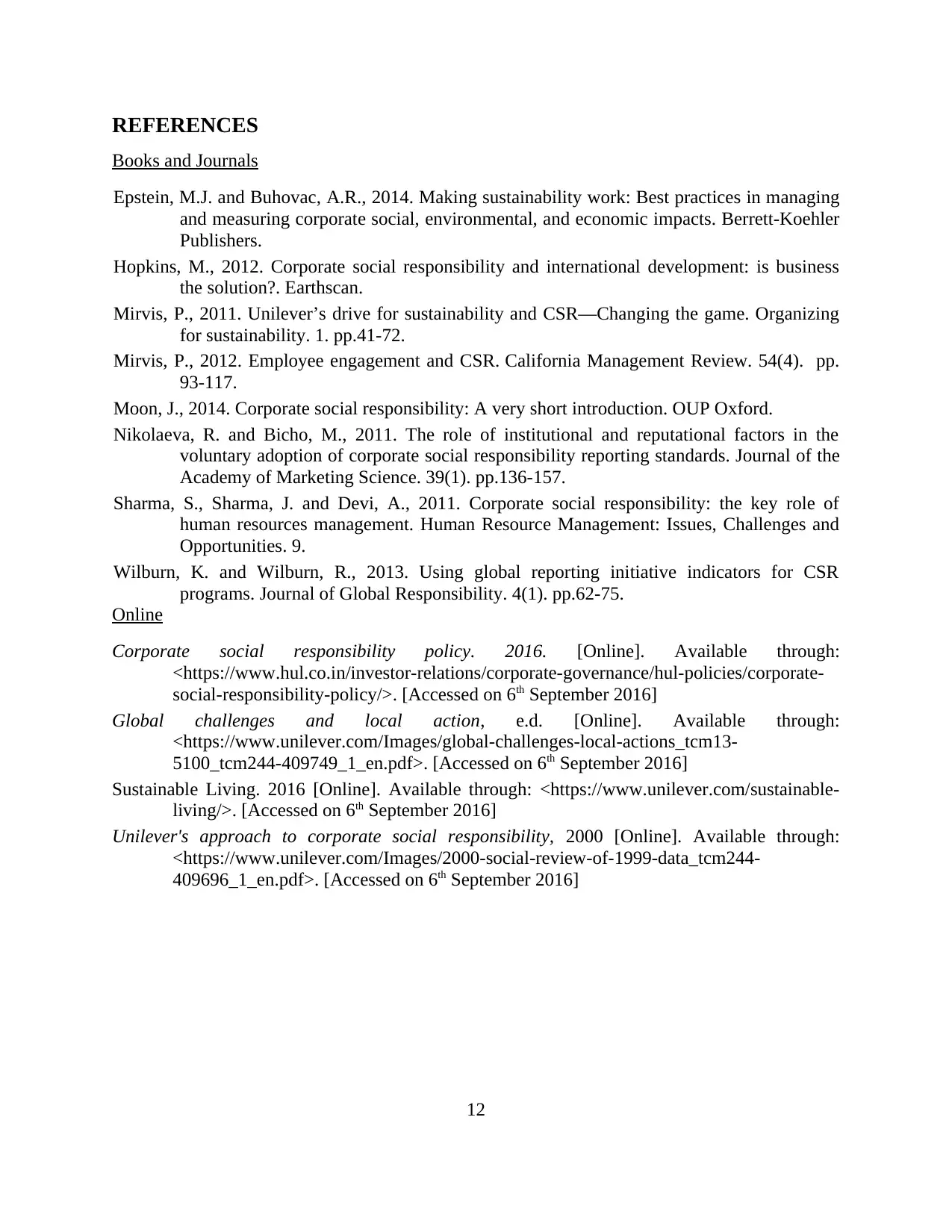
REFERENCES
Books and Journals
Epstein, M.J. and Buhovac, A.R., 2014. Making sustainability work: Best practices in managing
and measuring corporate social, environmental, and economic impacts. Berrett-Koehler
Publishers.
Hopkins, M., 2012. Corporate social responsibility and international development: is business
the solution?. Earthscan.
Mirvis, P., 2011. Unilever’s drive for sustainability and CSR—Changing the game. Organizing
for sustainability. 1. pp.41-72.
Mirvis, P., 2012. Employee engagement and CSR. California Management Review. 54(4). pp.
93-117.
Moon, J., 2014. Corporate social responsibility: A very short introduction. OUP Oxford.
Nikolaeva, R. and Bicho, M., 2011. The role of institutional and reputational factors in the
voluntary adoption of corporate social responsibility reporting standards. Journal of the
Academy of Marketing Science. 39(1). pp.136-157.
Sharma, S., Sharma, J. and Devi, A., 2011. Corporate social responsibility: the key role of
human resources management. Human Resource Management: Issues, Challenges and
Opportunities. 9.
Wilburn, K. and Wilburn, R., 2013. Using global reporting initiative indicators for CSR
programs. Journal of Global Responsibility. 4(1). pp.62-75.
Online
Corporate social responsibility policy. 2016. [Online]. Available through:
<https://www.hul.co.in/investor-relations/corporate-governance/hul-policies/corporate-
social-responsibility-policy/>. [Accessed on 6th September 2016]
Global challenges and local action, e.d. [Online]. Available through:
<https://www.unilever.com/Images/global-challenges-local-actions_tcm13-
5100_tcm244-409749_1_en.pdf>. [Accessed on 6th September 2016]
Sustainable Living. 2016 [Online]. Available through: <https://www.unilever.com/sustainable-
living/>. [Accessed on 6th September 2016]
Unilever's approach to corporate social responsibility, 2000 [Online]. Available through:
<https://www.unilever.com/Images/2000-social-review-of-1999-data_tcm244-
409696_1_en.pdf>. [Accessed on 6th September 2016]
12
Books and Journals
Epstein, M.J. and Buhovac, A.R., 2014. Making sustainability work: Best practices in managing
and measuring corporate social, environmental, and economic impacts. Berrett-Koehler
Publishers.
Hopkins, M., 2012. Corporate social responsibility and international development: is business
the solution?. Earthscan.
Mirvis, P., 2011. Unilever’s drive for sustainability and CSR—Changing the game. Organizing
for sustainability. 1. pp.41-72.
Mirvis, P., 2012. Employee engagement and CSR. California Management Review. 54(4). pp.
93-117.
Moon, J., 2014. Corporate social responsibility: A very short introduction. OUP Oxford.
Nikolaeva, R. and Bicho, M., 2011. The role of institutional and reputational factors in the
voluntary adoption of corporate social responsibility reporting standards. Journal of the
Academy of Marketing Science. 39(1). pp.136-157.
Sharma, S., Sharma, J. and Devi, A., 2011. Corporate social responsibility: the key role of
human resources management. Human Resource Management: Issues, Challenges and
Opportunities. 9.
Wilburn, K. and Wilburn, R., 2013. Using global reporting initiative indicators for CSR
programs. Journal of Global Responsibility. 4(1). pp.62-75.
Online
Corporate social responsibility policy. 2016. [Online]. Available through:
<https://www.hul.co.in/investor-relations/corporate-governance/hul-policies/corporate-
social-responsibility-policy/>. [Accessed on 6th September 2016]
Global challenges and local action, e.d. [Online]. Available through:
<https://www.unilever.com/Images/global-challenges-local-actions_tcm13-
5100_tcm244-409749_1_en.pdf>. [Accessed on 6th September 2016]
Sustainable Living. 2016 [Online]. Available through: <https://www.unilever.com/sustainable-
living/>. [Accessed on 6th September 2016]
Unilever's approach to corporate social responsibility, 2000 [Online]. Available through:
<https://www.unilever.com/Images/2000-social-review-of-1999-data_tcm244-
409696_1_en.pdf>. [Accessed on 6th September 2016]
12
⊘ This is a preview!⊘
Do you want full access?
Subscribe today to unlock all pages.

Trusted by 1+ million students worldwide
1 out of 12
Related Documents
Your All-in-One AI-Powered Toolkit for Academic Success.
+13062052269
info@desklib.com
Available 24*7 on WhatsApp / Email
![[object Object]](/_next/static/media/star-bottom.7253800d.svg)
Unlock your academic potential
Copyright © 2020–2025 A2Z Services. All Rights Reserved. Developed and managed by ZUCOL.





